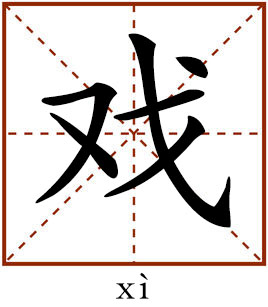Play

When used as a noun, this character refers to a drama, play, game, or a sport. When used as a verb, it usually means "to play tricks on."
烽火戏诸侯
fēng huǒ xì zhū hóu
Feng huo describes warning beacons, or the fires lit at the top of a watchtower to warn of enemies. In ancient China, this system was set up in the face of an external threat. Xi means "to make fun of" or "to play tricks on." Zhu hou refers to the rulers of vassal states and fiefs.
This term is derived from a story about the last king of the Western Zhou Dynasty (c. 1046–771 BCE), King You of Zhou. It is said that the king was dazzled by a woman named Baosi and made her his concubine. Baosi was an icy beauty who did not laugh a lot. After trying many methods and failing, a courtier provided an idea: light the beacons to mock the nobles. King You adopted it. On seeing the signal fire all the zhuhou ran to the palace thinking that the much-feared moment had finally arrived—the Quanrong nomads were about to attack—only to find that everything was a prank intended to make Baosi laugh. Even after he had impressed Baosi, the king continued to abuse his use of warning beacons and lost the trust of the zhuhou.
King You deposed Queen Shen and Crown Prince Yijiu. He made Baosi the new queen and their son Bofu the new crown prince. Furious at the deposition of his daughter and grandson Crown Prince Yijiu, Queen Shen's father, the Marquess of Shen, mounted an attack on King You's palace with the help of the Quanrong nomads. King You called for his nobles using the previously abused beacons, but none came. In the end, King You and Bofu were killed and the Western Zhou was overthrown.
King You of Zhou has become a cautionary tale in Chinese history. His story was used to warn rulers explicitly against the pursuit of an indulgent life of pleasure seeking. However, this story may not be true. According to an archaeological discovery from the bamboo scripts dating to the Warring States Period (475–221 BCE), the Shen family cooperated with Quanrong nomads to attack King You of Zhou because King You first attacked the vassal state of Shen.
Edited by REN GUANHONG
